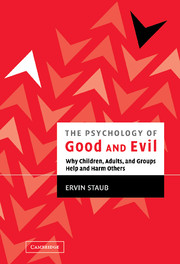Book contents
- Frontmatter
- Contents
- Preface
- Acknowledgments
- PART I INTRODUCTION AND CORE CONCEPTS
- PART II THE ROOTS OF HELPING OTHER PEOPLE IN NEED IN CONTRAST TO PASSIVITY
- PART III HOW CHILDREN BECOME CARING AND HELPFUL RATHER THAN HOSTILE AND AGGRESSIVE
- PART IV THE ORIGINS OF GENOCIDE, MASS KILLING, AND OTHER COLLECTIVE VIOLENCE
- PART V THE AFTERMATH OF MASS VIOLENCE: TRAUMA, HEALING, PREVENTION, AND RECONCILIATION
- 33 Preventing Group Violence
- 34 Kosovo: The Need for Flexible Bystander Response
- 35 The Effects of Violence on Groups and Their Members
- 36 Healing, Reconciliation, and Forgiving after Genocide and Other Collective Violence
- 37 Healing, Forgiveness, and Reconciliation in Rwanda: Project Summary and Outcome, with Addendum on Other Projects
- 38 Further Avenues to Prevention
- 39 Commentary: Human Destructiveness and the Refugee Experience
- 40 A Vision of Holocaust Education in Holocaust Centers and Schools
- 41 Out of Hiding
- 42 Review of Legacy of Silence: Encounters with Children of the Third Reich
- 43 What Can We Learn from This Tragedy? A Reaction Days after September 11, 2001
- PART VI CREATING CARING, MORALLY INCLUSIVE, PEACEFUL SOCIETIES
- Appendix: What Are Your Values and Goals?
- Index
43 - What Can We Learn from This Tragedy? A Reaction Days after September 11, 2001
Published online by Cambridge University Press: 07 May 2010
- Frontmatter
- Contents
- Preface
- Acknowledgments
- PART I INTRODUCTION AND CORE CONCEPTS
- PART II THE ROOTS OF HELPING OTHER PEOPLE IN NEED IN CONTRAST TO PASSIVITY
- PART III HOW CHILDREN BECOME CARING AND HELPFUL RATHER THAN HOSTILE AND AGGRESSIVE
- PART IV THE ORIGINS OF GENOCIDE, MASS KILLING, AND OTHER COLLECTIVE VIOLENCE
- PART V THE AFTERMATH OF MASS VIOLENCE: TRAUMA, HEALING, PREVENTION, AND RECONCILIATION
- 33 Preventing Group Violence
- 34 Kosovo: The Need for Flexible Bystander Response
- 35 The Effects of Violence on Groups and Their Members
- 36 Healing, Reconciliation, and Forgiving after Genocide and Other Collective Violence
- 37 Healing, Forgiveness, and Reconciliation in Rwanda: Project Summary and Outcome, with Addendum on Other Projects
- 38 Further Avenues to Prevention
- 39 Commentary: Human Destructiveness and the Refugee Experience
- 40 A Vision of Holocaust Education in Holocaust Centers and Schools
- 41 Out of Hiding
- 42 Review of Legacy of Silence: Encounters with Children of the Third Reich
- 43 What Can We Learn from This Tragedy? A Reaction Days after September 11, 2001
- PART VI CREATING CARING, MORALLY INCLUSIVE, PEACEFUL SOCIETIES
- Appendix: What Are Your Values and Goals?
- Index
Summary
Can the recent tragedy on our own shores teach us empathy for all people?
Who does not agree that the perpetrators of the horrible acts of last Tuesday must be stopped and punished? But more is necessary to combat terrorism. Feelings of injustice, disregard, deprivation, and humiliation are significant roots of terrorism. When people with deep grievances are unable to get any kind of redress, a breeding ground for terrorism exists. Such people will not necessarily turn to terrorism. They may turn against each other or even against their families. Or they may simply suffer.
But the possibility of taking action in their own behalf or the behalf of their family or group will be very appealing. And violent actions are often framed by “leaders,” whatever the leaders' motives, as expressions of higher ideals, such as the welfare of their people, serving justice, or the will of God. People in pain and others who identify with them can replace helplessness with a sense of meaning and purpose by striking out against those they see as their enemies, or the enemies of these higher ideals.
I believe the United States is a special target for terrorism for several reasons. One is that many people see some of our actions as a nation and some of the actions of U.S. corporations as contributor to their own and others' suffering. Another is that we are a source of and a symbol of great changes in the contemporary world.
- Type
- Chapter
- Information
- The Psychology of Good and EvilWhy Children, Adults, and Groups Help and Harm Others, pp. 479 - 480Publisher: Cambridge University PressPrint publication year: 2003



